Development Trajectory from 40’s
- A man will be very active at this age. He is laden with responsibility that range from family, work and self development.
- The person’s social experiences across his lifespan reflects growth and development. Erik Erickson’s theory of development outlines the gradual growth and development of human beings through a trajectory path.
- Sigmund Freud outlines human is growth and development through a psychosexual development theory, which is about the ego or human personality. In contrast, both theories use ego development as a key element.
- We will observe this person’s from Erik Erickson’s and Sigmund Freud’s perspectives.
Impacts of social experiences across this individual’s lifespan reflect growth and development. Throughout his life, he has been learning and achieving distinctive skills. What will his future be like? Erik Erickson’s theory of development outlines the gradual growth and development of human beings through a trajectory path. Sigmund Freud outlines human is growth and development through a psychosexual development theory, which is about the ego or human personality. In contrast, both theories use ego development as a key element.
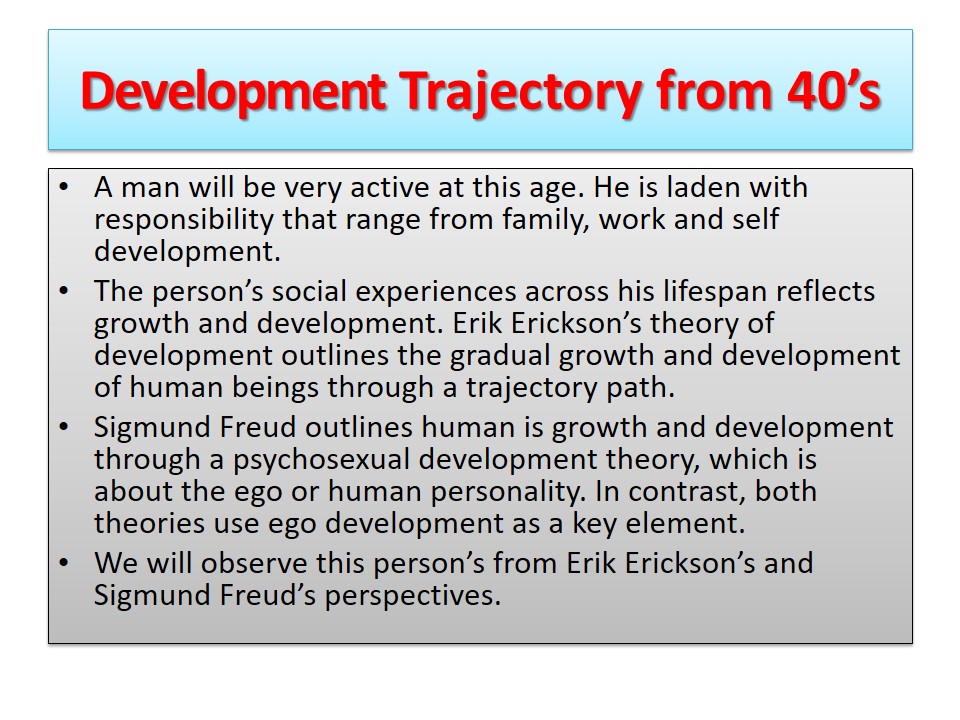
What is seen in a man then?
- The individual will achieve various distinctive social status. This could be wealth, social standings, new job, own a business, own a home and be a parent to teenagers.
- The person develops aptitude to reason and behaves maturely. Within this stage, pride and emotions that go along with such attributes hardly surface in this persons life.
- The person is surrounded by people who are looking up at him. Life is more defined to him than earlier. He is a parent, an educator, a worker and a person in a self crisis.
- The desire to achieve surpasses his emotional needs, hence the person is oblivious of his emotions and rather intends to uphold his moral and societal values (Karen, 1998).
While Sigmund Freud projects life as a crisis, Eriksson defines, human’s development of abilities to resolve and tackle arising life situations as crisis as well. Within the society, life becomes more constrained. Various factors become elements of change in our lives. This is observed in mid-adulthood and throughout the rest of lives as active members of the society. These elements include gender, environment, culture, and ethnicity.
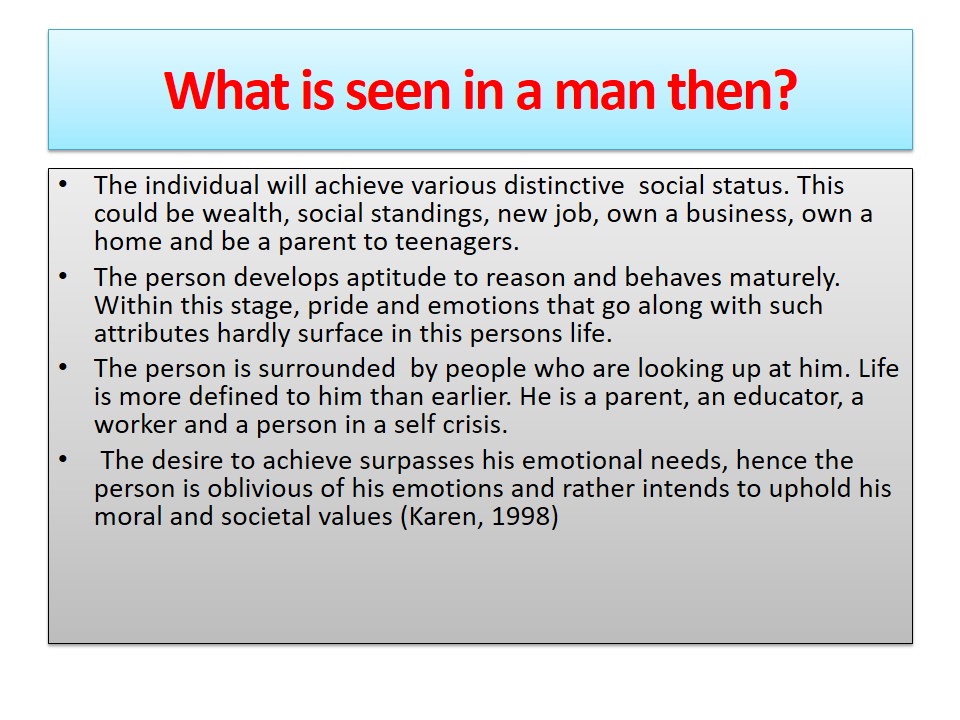
The trajectory phases
- Parenting;
- Social class;
- Property;
- Investments;
- Business;
- Savings;
- Work and challenging positions in employment.
Within mid-adulthood, the individual is responsible of many faculties that include family life, societal roles, work, and taking care of children while securing his future through investments. At this stage, this person productive and always in the process of giving back. Passing through this stage means a healthy passage. Looking at modern lifestyle for someone working and drawing a salary that sustains the mentioned roles, life is tedious and the person is focused.
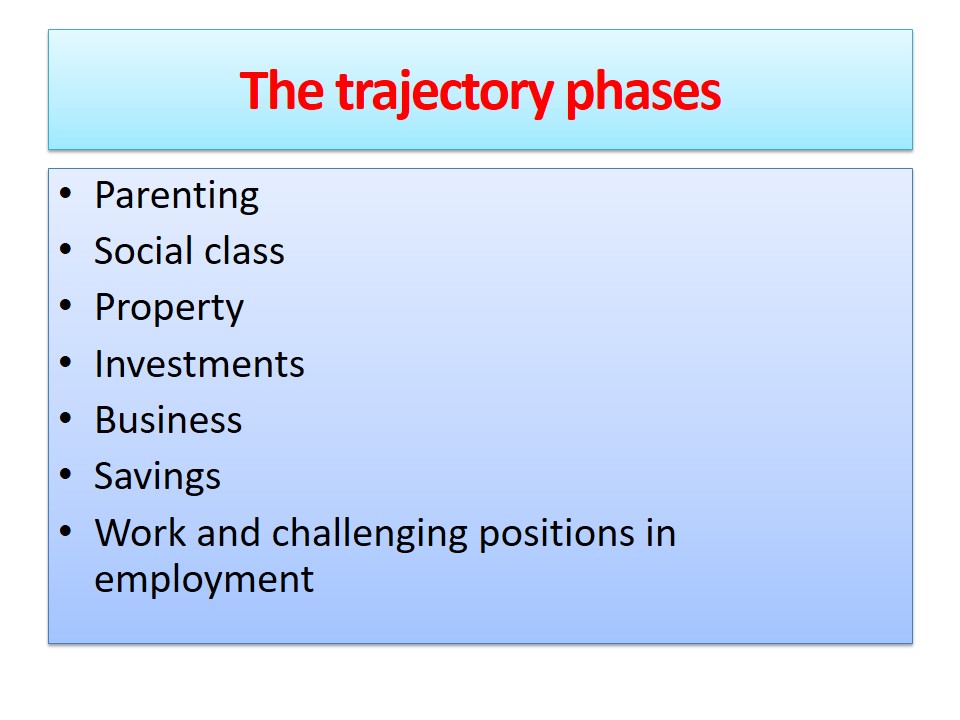
Gender and sex Influences
- As a man, this individual is in a crisis where in he needs to emulate successful males. Sexually, finding his identity through aggressive approach to life becomes his way (Brannon, 2002).
- He has to show his children and other young members of the society that he can be emulated.
- This is through upholding social values, being a co-educator, succeeding both as a parent and as an entrepreneur and worker.
- On the other hand, other males are looking up at him as a role model and a partner in the greater society. Within Freud’s context, our sexuality drives us to perform tasks that help us draw lines around our territory (Brannon, 2002).
Most notable is the persons mutual and generative effort s and subscriptions. Generative refers to his efforts to attain credible material wealth. What is he generating mutually, both to the society and to his personal life? While the society part is less significant, his role as a father has more responsibility hence he need to generate more. Erickson depicted ‘generative as a disposition within our life stages or crises. Mutuality in Erickson’s context refers to social generations and cultural factors affecting one’s life. This applies particularly on families, society, and our personal lives. Indeed, everyone affects the others experience as they pass each stages of life.
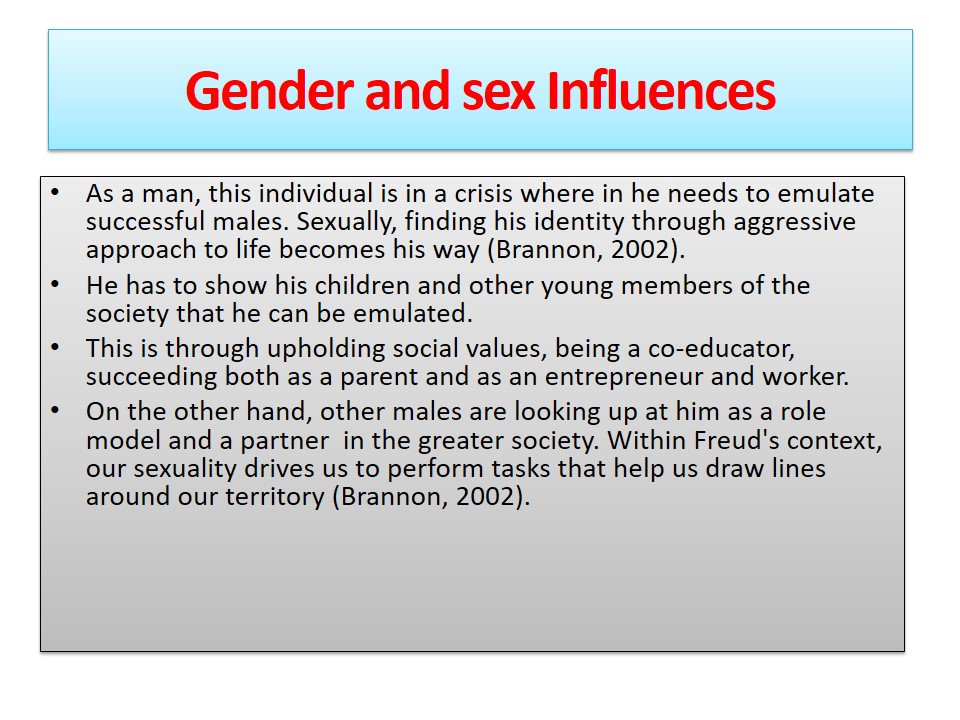
Cultural and environmental influences
- Culture is observed as what has been the norm or the habit of our fore fathers. Culture is what the environment demands be done continuously and as per the guideline.
- It is the role of the father to discipline, educate and even find suitable jobs for his children. It is a culture that fathers should provide for the family, that they should accumulate wealth, build a home and invest (Piaget, 1965).
- Our society is in an environment that demands we generate enough to bring sustenance of lifestyle. The father will have to build a home, provide and save for the children’s future. He should pile a significant inheritance (Marcia, 1976).
- This person is in a stage where he has to exhibit his morality, social values and objectiveness to portray the society as an important environment (Piaget, 1965).
Success in our lives, social dispositions, and status greatly affect our ego. This individual will find it satisfying when his children look healthy, are well dressed and performing well in school. children from stable backgrounds are confident and able to progress through their stages. This is an outcome of our ego, relationships, marriages and other affiliations. Self-absorption, conservative behavior, and at times inertia pull us down though. Our generative roles force us to identify ways to survive emerging crisis, which involve our teenage children, our careers, and investments.
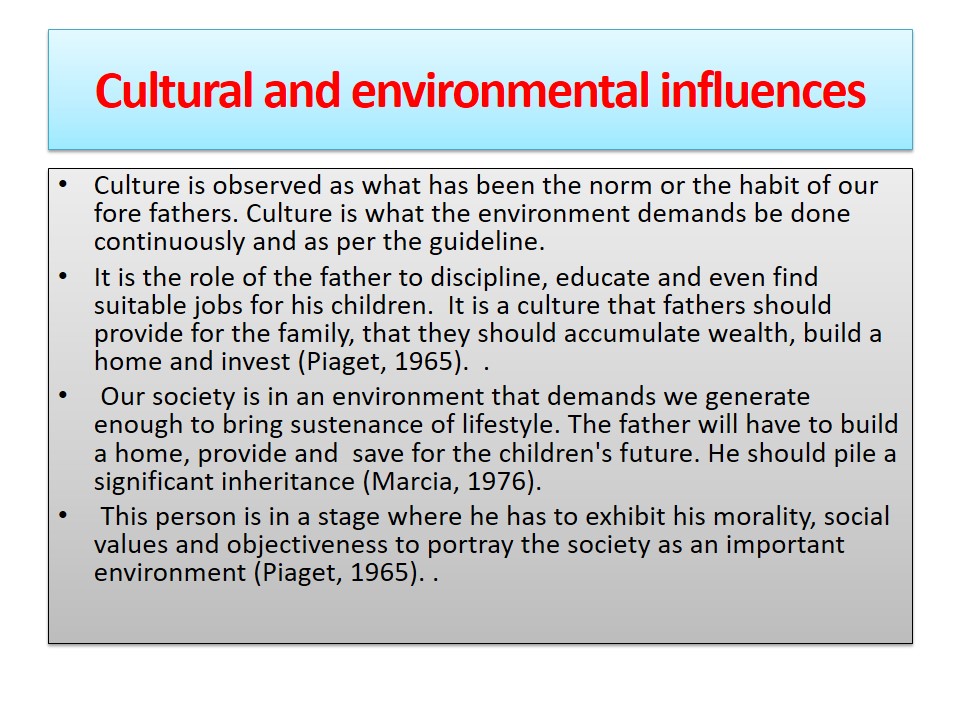
Other influences
Ethnicity propels an individual to fit within his class and affiliations. This individuals wants to rise above racial and social barriers and be indentified as a role model.
His efforts within this stage will determine the outcome of his ego and allow the materialization of his principal objectives in adulthood, both as a parent and a member of the society (Gilligan, 1982).
This is possible through Eriksson’s projection that during this stage of midlife, we are more productive, intuitive, and focused (Kohlberg & Turiel, 1971).
The objective of this stage is to manipulate remotely, life to fit our trajectory in a refined manner. Our children are in school and we want the best for them. We want to own properties, have stocks and investments, and have our own homes. These objectives cannot be wished away; they are necessities and will determine our future
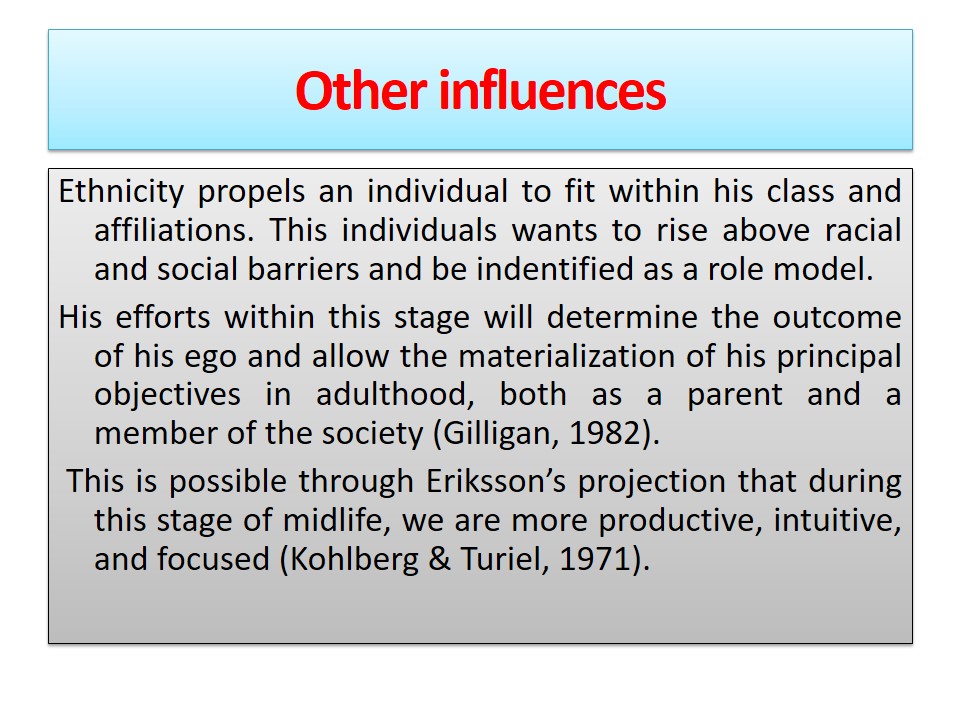
Reference list
- Brannon L. (2002): Gender Psychological Perspectives Allyn & Bacon.
- Gilligan, C. (1982). In a different voice: Psychological theory and women’s development. Harvard University Press: Cambridge.
- Karen. T (1998): Gender and Psychology. Ed.. London: Arnold.
- Kohlberg, L. & Turiel, E. (1971). Moral development and moral education. In G. Lesser, ed. Psychology and educational practice. Scott Foresman.
- Marcia J.E. (1976) Identity Six Years After: A Follow-Up Study. Journal of Youth and Adolescence, 5, p. 145-160.
- Piaget, J. (1965). The moral judgment of the child. The Free Press: New York.